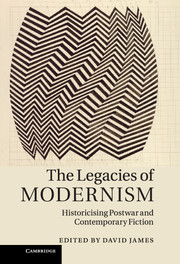Book contents
- Frontmatter
- Contents
- Notes on contributors
- Acknowledgements
- Introduction: mapping modernist continuities
- Part I Early legacies: inheriting modernism at mid century and beyond
- Part II Modernist aesthetics in transition: character, perception, innovation
- Part III Reassessing the ethics of modernist fiction
- Part IV Modernism's global afterlives
- Epilogue Finding the dreadfully real
- Index
- References
Introduction: mapping modernist continuities
Published online by Cambridge University Press: 05 November 2011
- Frontmatter
- Contents
- Notes on contributors
- Acknowledgements
- Introduction: mapping modernist continuities
- Part I Early legacies: inheriting modernism at mid century and beyond
- Part II Modernist aesthetics in transition: character, perception, innovation
- Part III Reassessing the ethics of modernist fiction
- Part IV Modernism's global afterlives
- Epilogue Finding the dreadfully real
- Index
- References
Summary
There is an ongoing need to ‘see the past in relation to the future’: so according to Virginia Woolf in ‘How It Strikes a Contemporary’, an essay from 1925 that provided her with an occasion to meditate on the way our understanding of even the most innovative writers cannot be divorced from their ancestry. Woolf 's implication that we can only fully evaluate what is new about the arts of the present through the very predecessors from which they may seek to depart is a valuable starting-point for exploring the coexistence of tradition and invention in fiction today. Bringing together both distinguished and emerging scholars of twentieth- and twenty-first-century literature, The Legacies of Modernism: Historicising Postwar and Contemporary Fiction offers a rich but by no means exhaustive engagement with the stylistic, thematic and political afterlives of the formal and intellectual ambitions of literary modernism.
At a time when it has become a critical commonplace to state the need for ever-expanding global maps of modernism's contexts of production, it may seem churlish to insist that we urgently need to extend – in a similar impulse of critical and methodological expansion – modernism's boundaries by charting its late twentieth-century continuities. However, the pertinence of this book of essays lies precisely in its effort to substantiate the basic speculation that the modernist project is unfinished. In so doing, The Legacies of Modernism offers a forum for reflecting on how we can historicise the past sixty years of Anglophone fiction by relating its innovations to those of early twentieth-century writing. That the following chapters confine themselves to fiction is by no means an attempt to rehearse the generic elevation of the novel, in David Lodge's words, as ‘arguably man's most successful effort to describe the experience of individual human beings moving through space and time’. It could indeed be argued that narrative fiction (as distinct from poetry, drama, memoir or reportage) has in the postwar era offered the most capacious and dynamic medium for studying how writers have re-engaged with modernism's aesthetic and ideological challenges. Yet in this book, several contributors show how the consequences of modernism should be read alongside the very processes and circumstances through which the generic superiority of the novel has been contested. Relocating modernism's global legacy, for example, Susan Andrade, Peter Middleton, Rebecca Walkowitz and Tim Woods invoke transnational and postcolonial contexts in an awareness that to prioritise fiction (over other genres) as the re-energiser of modernism is to become ‘answerable’, in Peter Hitchcock's phrase, to the fact that the novel is ‘inexorably colonialism's success, a narrative form writ large in modernity's reach’. At the same time, this book finds in the novel's contested relation to colonial modernity the very reason to embrace rather than dismiss the paradoxes we confront when investigating postcolonial writers' contributions to modernism's recrudescence. If anything, the essays here respond to the recent shift in scholarly interest that sees less attention being paid to modernism's conceptual links to, or tenuous divides from, postmodernism, than to the implications of its correspondence both with the histories of decolonisation and with the contemporary geopolitical challenges of globalisation. In so doing, this collection follows the cue of Simon Gikandi's shrewd contention that while our initial impulse might be to spotlight ‘modernism as the site of Eurocentric danger’, in the knowledge that ‘modernism represents perhaps the most intense and unprecedented site of encounter between the institutions of European cultural production and the cultural practices of colonized people’, we should also explore the fact that ‘without modernism, postcolonial literature as we know it would perhaps not exist’.
- Type
- Chapter
- Information
- The Legacies of ModernismHistoricising Postwar and Contemporary Fiction, pp. 1 - 20Publisher: Cambridge University PressPrint publication year: 2011
References
- 2
- Cited by



